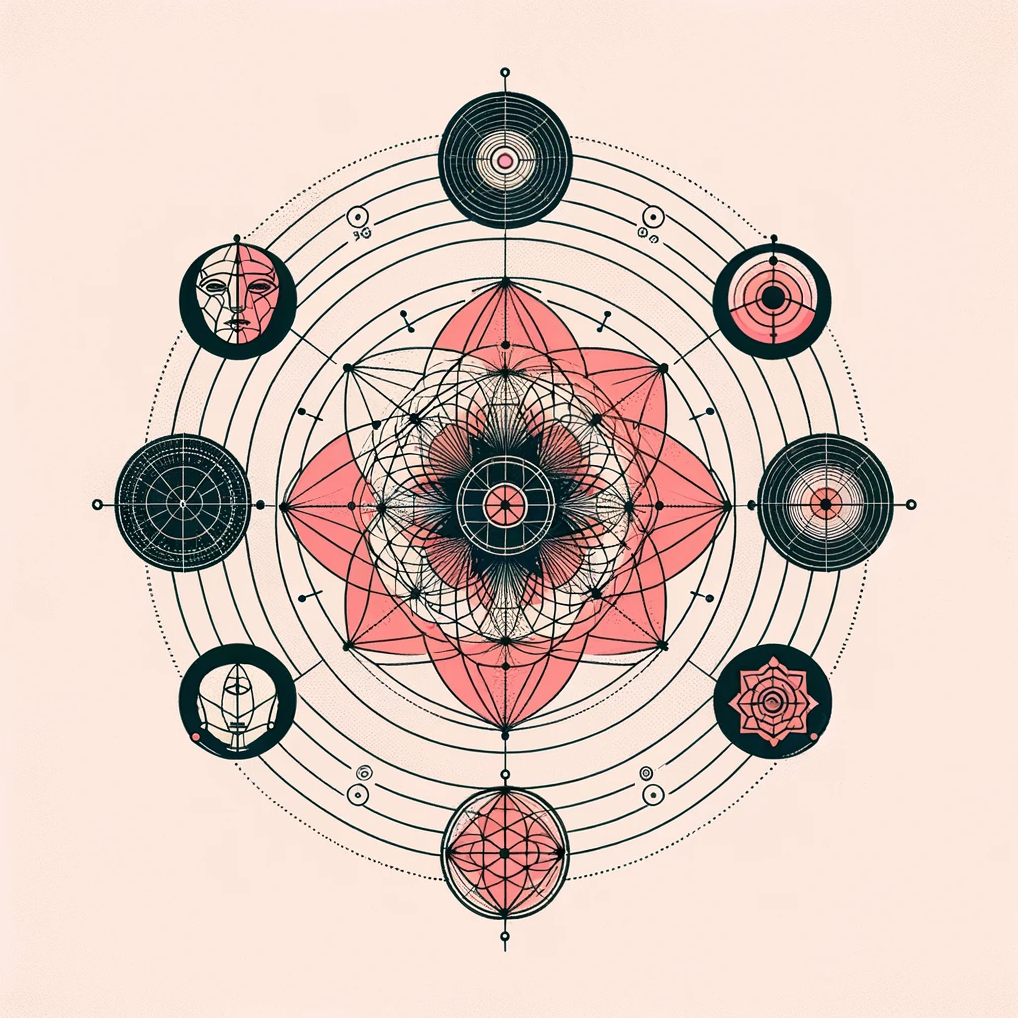The Ajna Center: Third Eye Chakra, Knowing, Beliefs, Certainty
Having a defined Ajna Center in Human Design can offer some interesting insights into how you process thoughts and make sense of the world. In Human Design, the Ajna is the center for processing, thinking, and belief systems. It’s about how you analyze information and how certain you are in your conclusions. You’ll have consistent ways of thinking and fixed ways of knowing.
Navigating Life with a Defined Ajna Center:
Consistent Way of Thinking: With a defined Ajna, there’s a consistent way of processing thoughts and information. It means that the way you think and analyze information is stable and predictable, which can be a great asset in decision-making and in forming beliefs.
Mental Certainty: People with a defined Ajna often have a level of certainty in their thoughts and beliefs. This doesn’t necessarily mean they are always correct, but they have confidence in their mental processes and conclusions. This can be particularly empowering in areas of life where decision-making and understanding are key.
Potential for Influence: Since your way of thinking and your beliefs are consistent, you have the potential to influence others’ thought processes and belief systems. This can be especially important in your roles as a guide and coach, where sharing insights and guiding others through their thoughts and beliefs is part of your work.
Learning Style: Understanding your defined Ajna can also give insights into your learning style. You might find that you prefer certain types of information or ways of learning that align with your consistent way of thinking. This can help you optimize how you acquire new knowledge and skills.
Communicating with Clarity: You might find it easier to communicate your thoughts and ideas with clarity. This is because your consistent thought processes allow you to be clear and concise in how you express yourself, which can be incredibly beneficial in both personal and professional settings.
Potential Challenges: Being very set in your ways of thinking could sometimes limit openness to new ideas or perspectives. It’s beneficial to remain aware of this tendency and consciously cultivate openness and flexibility.
Navigating Relationships: In relationships, your defined Ajna means you may need to be mindful of how your certainty and strong beliefs interact with others, especially those with an undefined Ajna. Create space for different perspectives and ways of thinking to enhance your connections and interactions.
Understanding these aspects of the defined Ajna Center can be incredibly useful in personal development, coaching, and guiding others. It offers a framework for recognizing one’s strengths in thinking and processing, as well as areas for growth and adaptation. Remember, the beauty of Human Design lies in its ability to provide insights into our unique designs, encouraging us to live in alignment with who we truly are.
Navigating Life with an Undefined Ajna Center:
Navigating life with an undefined Ajna Center in Human Design offers a unique perspective on thinking, processing information, and forming beliefs. Unlike those with a defined Ajna Center who have consistent ways of thinking, if you have an undefined Ajna, your experience can be more fluid and adaptable.
Openness to Different Perspectives: One of the gifts of having an undefined Ajna is the ability to see things from various perspectives. You’re naturally open to considering different viewpoints and ideas, which can make you versatile and adaptable in your thinking.
Influenced by the Environment: Your thoughts and beliefs can be significantly influenced by your environment and the people around you. This means you can be very empathetic and understand others’ viewpoints deeply. However, it’s also important to discern which thoughts and beliefs are truly yours versus those you’ve picked up from your surroundings.
Flexibility in Beliefs: Unlike the fixed nature of a defined Ajna, having an undefined Ajna means your beliefs can evolve and change over time. This flexibility can be a strength, allowing you to grow and adapt as you gain new experiences and insights.
Learning to Trust the Process: Without the consistency of a defined Ajna, you might sometimes feel uncertain or indecisive. Embracing this as part of your process can help you learn to trust in the journey of developing your own beliefs and opinions over time, rather than feeling pressured to have all the answers right away.
Wisdom through Observation: You have the potential to develop wisdom by observing and reflecting on the multitude of perspectives you encounter. This can become a powerful tool in your work as a guide and coach, where understanding and integrating diverse viewpoints can enhance your ability to support others.
Communicating Uncertainty: Being comfortable with expressing “I don’t know” or acknowledging when you’re unsure can be empowering. It allows for authentic communication and opens up space for dialogue and exploration, both with yourself and in your interactions with others.
Guarding Against Mental Overload: Since your Ajna isn’t defined, you might find that too much information or too many opinions can be overwhelming. Learning to limit your exposure to overly stimulating environments or taking breaks to clear your mind can help maintain your mental well-being.
Navigating Relationships: In relationships, your openness can allow you to deeply understand and empathize with others. However, it’s also crucial to maintain your sense of self and not lose your perspective amidst the influence of those around you.
Understanding the nature of an undefined Ajna Center can empower you to navigate its challenges and leverage its strengths. Embracing your adaptability, remaining open to learning, and cultivating discernment about which influences you accept into your life are key aspects of living harmoniously with an undefined Ajna. This approach not only enriches your personal growth but also enhances your capacity to guide and support others with empathy and understanding.
Bringing the Ajna Center into Balance
Balancing the Ajna Center—which is associated with mental processes, reasoning, and awareness—can lead to clearer thinking and decision-making. Remember, balancing the Ajna Center, like any aspect of self-improvement, is a personal journey and what works for one person may not work for another. Listen to your body and mind, and adjust as needed.
Meditation and Mindfulness: Regular meditation can help calm the mind, reduce stress, and increase clarity. Mindfulness practices encourage you to be present and aware, helping to balance the Ajna Center by reducing overthinking and worry.
Healthy Skepticism: While the Ajna Center is all about forming opinions and beliefs, it’s important to hold them lightly. Being open to new information and perspectives can help keep this center flexible and balanced.
Intellectual Stimulation: Engaging in activities that challenge your mind, such as reading, puzzles, or learning new subjects, can stimulate the Ajna Center in a positive way. Be sure to not overdo it and allow time for relaxation.
Adequate Rest: Ensuring you get enough sleep is crucial for mental clarity and balance. A tired mind is more prone to stress and imbalance, so prioritize rest.
Journaling: Writing down your thoughts and reflections can help clear your mind and bring insights into your mental patterns. This can be particularly helpful in understanding how your Ajna Center operates.
Limit Stimulants: Reducing intake of stimulants like caffeine can help lower anxiety and restlessness, contributing to a more balanced Ajna Center.
Visualizations and Affirmations: Visualizing balance and clarity in your Ajna Center, combined with affirmations that promote understanding and open-mindedness, can reinforce mental equilibrium.
Connect with Nature: Spending time in natural surroundings can help reset your mental state, reducing overstimulation and promoting serenity.
Gates in the Ajna Center
Gate 47: The Gate of Realization | Oppression. Concerned with the realization and understanding that come after a period of confusion or contemplation. It’s about making sense of the past to inform the future.
Gate 24: The Gate of Rationalization | Returning. This gate is associated with the process of rationalizing thoughts and experiences. It’s about the internal process of making sense of things, leading to renewal and transformation of ideas.
Gate 4: The Gate of Answers | Youthful Folly. Related to the logical process of forming solutions to problems. It’s about the mental consideration of ways to address issues logically.
Gate 11: The Gate of Love of Self | Treading. Associated with the abundance of ideas and the capacity to envision possibilities. It’s not necessarily about the implementation but the conceptualization of ideas.
Gate 43: The Gate of Insight | Breakthrough. Represents breakthroughs and sudden insights that come from within. This gate is about knowing from an inner voice or intuition, often leading to innovative ideas.
Gate 17: The Gate of Opinions | Following. Focuses on forming opinions based on patterns and logical analysis. This gate is about having theories and trying to find a consensus among them.






